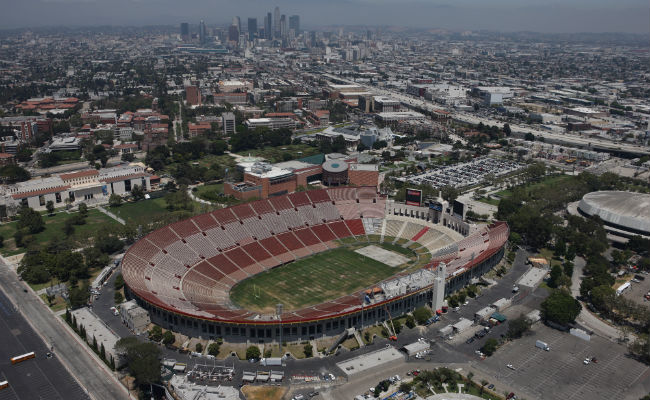
Los Angeles Memorial Coliseum may be best known for USC football games and the 1986 Olympic Games, and it may not be associated with an airline after public outcry over a potential naming agreement may nullify the stadium’s rebrand.
According to the Associated Press, USC is open to modifying or cancelling the naming rights agreement it made with United Airlines, which was signed last year as part of a renovation financing agreement it made with the airline.
A $69 million deal to put United Airlines on the iconic stadium’s facade could fall apart after the airline offered the University of Southern California an option to dissolve the deal following criticism. The proposed name, United Airlines Memorial Coliseum, was part of a $270 million redevelopment deal of the venue, which is nearly a century old.
But many questioned the renaming, and United Airlines decided to offer USC an out to avoid further criticism.
United Airlines California President Janet Lamkin said in a letter to USC official Todd Dickey that the company made “a significant commitment to financing this project” in exchange for the naming rights and was careful to keep the words “Memorial Coliseum” to honor the memory of veterans.
“If USC is not in a position to honor the terms of the agreement, including in particular the name change, United would be amenable to abiding by the wishes of the community, stepping away from this partnership with USC, and mutually terminating the agreement,” Lamkin wrote in the letter obtained by The Associated Press.
USC quickly responded that it would be open to “accepting the wishes of the veteran community to modify the proposed naming agreement to United Airlines Field at Los Angeles Memorial Coliseum.” The university said the airline would have to agree and the deal would have to be changed, but it didn’t provide details.
Critics say the adding of an airline’s name to the building’s title was inappropriate given that the building was named in honor of veterans of World War I when it was first commissioned in 1921. Other stadiums, like Soldier Field in Chicago were named for similar reasons and remain unaffected by stadium sponsorship deals.






